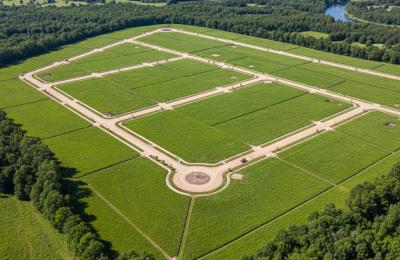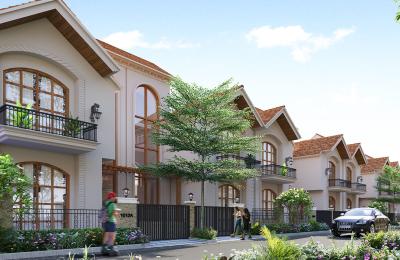Sonipat, Haryana
Why Buyers Are Choosing Deen Dayal Plots Over Private Colonies
Over the past few years, the real estate sector in Haryana and NCR has witnessed a massive transformation, primarily due to government-backed affordable housing initiatives. One such landmark scheme is the Deen Dayal Jan Awas Yojna (DDJAY), introduced by the Government of Haryana. The scheme was designed to provide affordable housing opportunities in planned colonies across the state, particularly targeting the middle-income group.
Among the most attractive offerings under this scheme are the Deen Dayal Plots—residential plots available at affordable rates with government support and legal assurance. With clear regulations, transparency, and better infrastructure, these plots are increasingly preferred by homebuyers when compared to private colonies.
In this article, we will explore in detail why buyers are choosing Deen Dayal Plots over private colonies, the advantages of investing in Deen Dayal Jan Awas Plots, how eligibility works, and why the Deen Dayal Awas Yojna List matters.
What is Deen Dayal Jan Awas Yojna (DDJAY)?
The Deen Dayal Jan Awas Yojna was launched in 2016 by the Haryana Government with the objective of encouraging affordable and high-density plotted colonies in medium and low-potential towns.
The scheme focuses on:
Making housing affordable for middle-income families.
Promoting planned residential colonies instead of unregulated private colonies.
Providing Deen Dayal Jan Awas Plots with clear documentation and legal safety.
Offering facilities such as roads, sewage, water supply, and electricity.
Under this scheme, buyers can purchase residential plots ranging from 60 to 150 square yards at affordable rates.
Why Buyers Prefer Deen Dayal Plots Over Private Colonies
1. Affordability and Government Support
Private colonies often inflate land prices, making them unaffordable for average families. In contrast, Deen Dayal Plots are offered under a government-regulated framework, ensuring affordability and transparency.
2. Legal Security and Clear Title
One of the biggest challenges with private colonies is the risk of unclear land titles or unauthorized constructions. Under the Deen Dayal Jan Awas Yojna, buyers get plots that are pre-approved by the government, ensuring no future legal disputes.
3. Better Infrastructure
Unlike unplanned private colonies, Deen Dayal Jan Awas Plots come with planned roads, proper sewage systems, drainage, water supply, and green zones, which make them more livable in the long run.
4. Eligibility Benefits
The Deen Dayal Awas Yojna eligibility criteria ensure that genuine homebuyers benefit from the scheme. This filters out speculative investors and prioritizes real residents.
5. Transparent Allotment Process
Private colonies often lack transparency in plot allocation. In contrast, Deen Dayal Awas Yojna Haryana Apply online makes the process digital, fair, and transparent for applicants.
6. Higher Return on Investment
As these plots are government-backed and located in developing urban zones, the resale value of Deen Dayal Plots is often higher compared to plots in unregulated private colonies.
7. Ease of Financing
Financial institutions readily provide home loans for Deen Dayal Jan Awas Yojna plots since they are government-approved, unlike private colonies where financing can be challenging.
Benefits of Deen Dayal Jan Awas Plots
Affordable pricing compared to private colonies.
Hassle-free loan approvals due to legal backing.
Long-term value appreciation.
Proper infrastructure like roads and parks.
Easy application through the Deen Dayal Awas Yojna List.
Transparent eligibility norms.
No hidden development charges.
Approved by the Directorate of Town & Country Planning (DTCP), Haryana.
Safer investment compared to private colonies.
Government incentives for buyers.
Understanding Deen Dayal Awas Yojna Eligibility
To ensure that the scheme benefits genuine buyers, the Deen Dayal Awas Yojna eligibility criteria include:
The applicant must be an Indian citizen.
Age must be 18 years or above.
The applicant should not already own a residential plot or flat under DDJAY in the same town.
Income groups may be prioritized for certain projects.
These eligibility conditions ensure fairness and discourage hoarding of plots by big investors.
Sonipat Plots for Sale

Sonipat, Haryana

Sonipat, Haryana
Importance of the Deen Dayal Awas Yojna List
The Deen Dayal Awas Yojna List is an official record published by authorities that includes all approved projects under DDJAY. This list is crucial because:
It helps buyers verify authenticity before investing.
Provides transparency in project allocation.
Protects buyers from fraud and illegal private colonies.
Ensures that the project has government approval.
Before buying a plot, homebuyers should always cross-check with the Deen Dayal Awas Yojna List to confirm authenticity.
Private Colonies vs. Deen Dayal Plots – A Comparison
Factor | Private Colonies | Deen Dayal Plots |
|---|---|---|
Legal Approval | Often questionable | Fully approved under DDJAY |
Price | Inflated | Affordable & regulated |
Infrastructure | Poorly planned | Well-planned & maintained |
Transparency | Low | High, via online application |
Loan Availability | Difficult | Easily available |
Long-term Value | Uncertain | High resale & appreciation |
This table clearly highlights why Deen Dayal Jan Awas Plots are the preferred choice for today’s homebuyers.
How to Apply for Deen Dayal Jan Awas Plots
Applying for plots under the scheme is simple:
Visit the official portal for Deen Dayal Awas Yojna Haryana Apply online.
Select the project from the Deen Dayal Awas Yojna List.
Fill in the application form with personal and financial details.
Upload required documents (ID proof, address proof, income proof, etc.).
Pay the application fee.
Wait for the allotment process conducted by authorities.
The digital application ensures fairness and transparency.
Why NCR Buyers Are Attracted to Deen Dayal Jan Awas Yojna
Rising property prices in Gurgaon, Faridabad, Sonipat, and Panipat have made private colonies unaffordable.
Buyers want government-backed projects for safety.
Families prefer planned colonies with infrastructure.
Young professionals see these plots as an affordable first investment.
Long-Term Impact of DDJAY on NCR Real Estate
The Deen Dayal Jan Awas Yojna is not only providing affordable homes but also reshaping urban development. By discouraging illegal private colonies and encouraging planned housing, it is ensuring balanced urban growth in Haryana’s NCR belt.
FAQs on Deen Dayal Plots and Private Colonies
Q1. What is the Deen Dayal Jan Awas Yojna?
It is a Haryana government housing scheme providing affordable residential plots.
Q2. What are Deen Dayal Plots?
They are residential plots offered under the DDJAY scheme at affordable rates.
Q3. How do Deen Dayal Jan Awas Plots differ from private colonies?
They are government-approved, affordable, and come with planned infrastructure.
Q4. What is the Deen Dayal Awas Yojna eligibility?
Applicants must be Indian citizens, 18+, and should not already own a DDJAY property in the same town.
Q5. Can I apply online for DDJAY plots?
Yes, through the official portal under Deen Dayal Awas Yojna Haryana Apply online.
Q6. What is the size range of plots available?
Plots generally range from 60–150 square yards.
Q7. Are loans available for Deen Dayal Plots?
Yes, banks provide loans due to the legal security of these plots.
Q8. How do I verify a project’s authenticity?
By checking the official Deen Dayal Awas Yojna List published by authorities.
Q9. Do these plots have resale value?
Yes, resale value is high due to legal backing and infrastructure.
Q10. Can NRIs buy Deen Dayal Plots?
Yes, subject to eligibility conditions and RBI guidelines.
Q11. Is possession guaranteed on time?
Yes, since projects are monitored by DTCP.
Q12. What facilities are provided in Deen Dayal Jan Awas Plots?
Roads, sewage, water, electricity, and green zones.
Q13. Are there hidden charges like in private colonies?
No, all charges are clearly mentioned in government guidelines.
Q14. Which towns in NCR offer DDJAY plots?
Gurgaon, Faridabad, Sonipat, Panipat, Palwal, and more.
Q15. Why are Deen Dayal Plots safer than private colonies?
Because they are government-backed, legally approved, and transparent.
The Deen Dayal Jan Awas Yojna has emerged as a game-changer for affordable housing in Haryana and NCR. Buyers are increasingly choosing Deen Dayal Plots over private colonies due to affordability, legal security, infrastructure, and transparency. With government monitoring and clear eligibility norms, these plots are not only safer investments but also promise better long-term returns.
By checking the Deen Dayal Awas Yojna List and applying online, buyers can secure a home that is affordable, reliable, and future-ready. For middle-class families and young professionals, this scheme is truly a golden opportunity to own a home in the NCR region.





